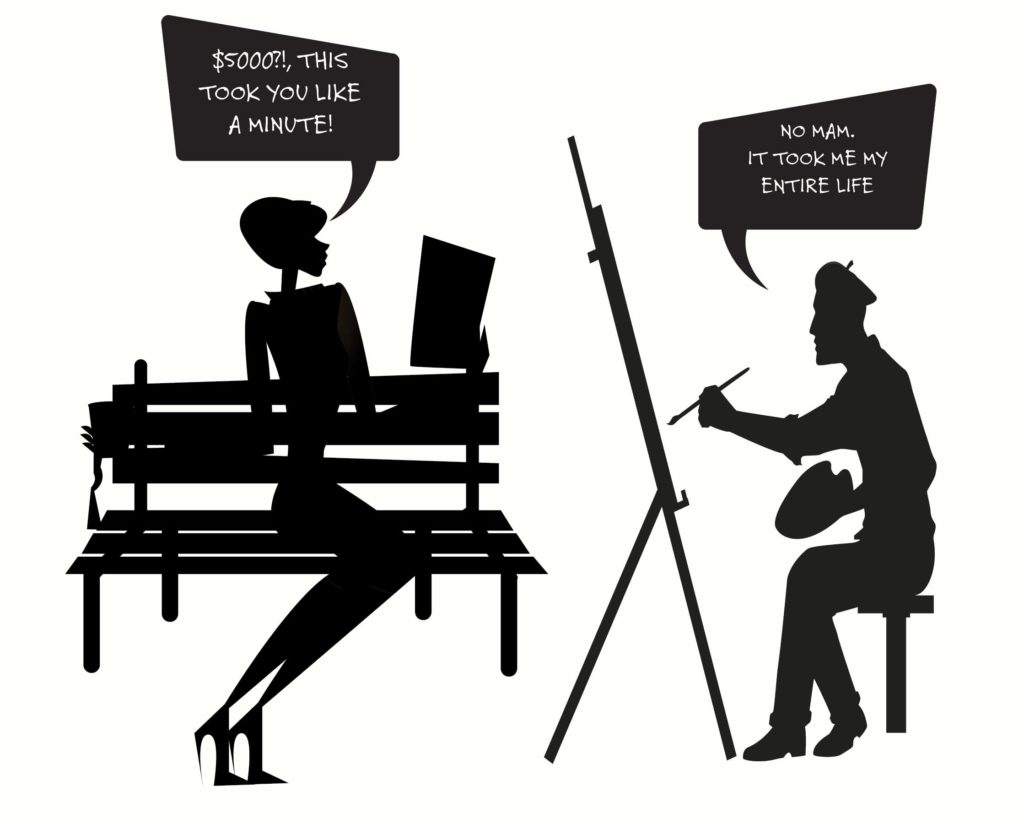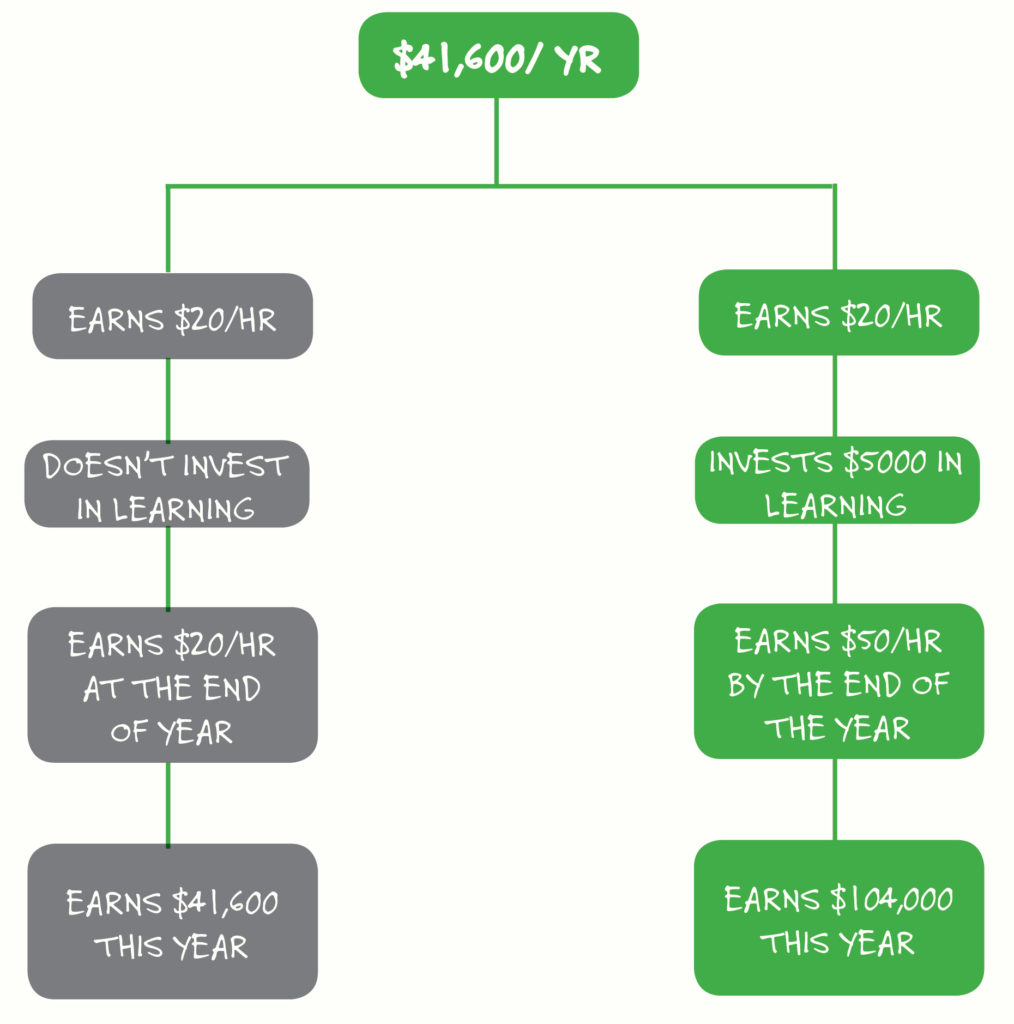There’s an old story I heard about Picasso. He was sitting in the park when he was approached by a woman who asked him to make a portrait of her. He agreed and quickly drew her portrait, and handed to the woman. She was very pleased. “Wow, this is perfect. How much do I owe you?”. “$5,000”, Picasso replied. “$5,000, but it only took you a few minutes to draw this!”. “No mam”, Picasso replied. “It took me my entire life”.
 Why is this story important? Well, most people fail to realize the price of mastery. Once mastery is accomplished, others don’t understand the value. They view the value of time incorrectly.
Why is this story important? Well, most people fail to realize the price of mastery. Once mastery is accomplished, others don’t understand the value. They view the value of time incorrectly.
If you desire someone’s time, you’re not desiring their current time, you’re actually desiring the value of all of their past time that went into making their current time desirable. It took them a long time to learn the things they know how to do that make you desire access to their current time.
So, the “just 5-10 minutes of your time!” you desire from someone, likely took them at least 5-10 years to produce the result of such valuable time that others crave to have it.
They likely did not work so hard to give it away to those who value it the least- those people who would like it for free. That’d be essentially giving it to those who really don’t understand the value, or who appreciate it the least. So, besides losing that time forever, it is not likely it will be put to use.
The price of something helps separate the people who it is valuable to from the people it isn’t. Giving away time to those who just want things free, only de-leverages the person’s time they’re taking from, and gives it to a person who is significantly less likely do anything with it.
Do not ever let anyone make you feel bad for not giving away your most valuable asset for free. The one you made more valuable by hard work and sacrifice, which is why they desire it. All they are saying is, “I do not value your time, can I steal it from you?”.
These are the only places you should be spending your time:
- With people who value your time
- With people you enjoy spending it with
- Doing things you enjoy
- Continually learning(which increases your value, and your ability to spend it how you want)
- Ideally some combination of the above
Giving value to others would be included in “spending it with people who value your time”, but it’s important to understand that if you give to those who don’t value it, you would not actually be giving value because they will be less likely to use it. To better explain what I mean, take this experiment I ran:
Hundreds of people write me asking for free things- often involving my time- calls, advice, etc… I usually respond requesting that they read all of my articles first, and follow up with me in a week. ZERO people have followed up. It’s a good indication of how little they valued the time, but would have gladly taken it from me if it was “free”.
Since the time you are burning is not in the form of actual dollars you don’t realize they’re being stolen from you. Every time you are considering a time burning activity, picture your money going up in flames, it will help you realize the robbery that’s about to take place.
Even if you only participated in time burning 2 hours/week, let’s say your time is worth $100/hr, you realize you’re giving away $10,400/yr?
Valuing time
Now let’s talk about some of the other times you may be inadvertently making bad decisions based around flawed understanding of the value of time:
How many times have you spent lots of time doing something, that could have been time saved if you’d paid an expert to teach you how to do it better/more efficiently, or just paid someone to do it for you in general?
How many of you attempt to do your own grass, or clean your home, or fix your car, or learn how to start a business on your own?
It’s likely you’re misapplying your time.
Have you heard the parable about the plumber? My dad used to tell me this story as a kid, and it’s similar to the Picasso story. A man is having a problem with his pipes so he calls a plumber. The plumber looks around and listens to the pipes. He walks over to a pipe, and hits it with a wrench. The man is thrilled until the plumber hands him a bill for $200. “All you did was bang the pipe with a wrench, I want to see an itemized invoice!”, the man demanded. The plumber broke down the itemized invoice and handed it back to the man. It read:
Hitting pipe with wrench: $1
Knowing where to hit it: $199
The value didn’t come from hitting it, it came from the mastery he’d acquired so that he would know exactly where to hit it. The man clearly could have hit the pipe himself, but there’s no way he would have ever known where to do so if he had.
How many times do you find yourself getting angry at a high bill because you don’t place value in the proper place?- the knowledge for knowing how to do something.
Successful people often find themselves paying for the expertise of someone else to help save them the time to progress faster towards their goals. The unsuccessful let the emotion of the high cost for something they can’t see as tangible(the person having spent so long to learn the craft), so they let it hold them back. It takes them much longer to do it themselves, if they ever get around to being able to do it at all.
In case you hadn’t had enough stories for one article, let’s apply it to business with the story that’s been told about Henry Ford:
“Ford, whose electrical engineers couldn’t solve some problems they were having with a gigantic generator, called a man by the name of (Charles) Steinmetz in to the plant. Upon arriving, Steinmetz rejected all assistance and asked only for a notebook, pencil and cot. Steinmetz listened to the generator and scribbled computations on the notepad for two straight days and nights. On the second night, he asked for a ladder, climbed up the generator and made a chalk mark on its side.
Then he told Ford’s skeptical engineers to remove a plate at the mark and replace sixteen windings from the field coil. They did, and the generator performed to perfection.
Henry Ford was thrilled until he got an invoice from General Electric in the amount of $10,000. Ford acknowledged Steinmetz’s success but balked at the figure. He asked for an itemized bill.
Steinmetz responded personally to Ford’s request with the following:
Making chalk mark on generator $1.
Knowing where to make mark $9,999.
Ford paid the bill.”
(source: https://www.smithsonianmag.com/history/charles-proteus-steinmetz-the-wizard-of-schenectady-51912022/)
It is a poor mindset(literally) when you relate how expensive something should be based on time.
Learning a valuable skill from someone who’s worth $500/hr doesn’t cost you $500/hr, it either allows you to become worth a certain % of that value, or to free your time to make up that value by doing things you’re good at.
Let’s look at both.
Allowing you to become worth a certain % of that value:
If you have a business coach, maybe learning from a $500/hr person teaches you to be worth $200/hr over time. Instead, many $20/hr people talk about how expensive the $500/hr is. If you understand math, you’d realize it’s significantly more expensive to remain a $20/hr earner.
There’s plenty of people who’ve been talking about starting a business for years. They make $10/hr, or $20/hr, or whatever amount they make, and they don’t want to “risk” investing to learn how to start a profitable business. Well, let’s see how flawed the math is.
Poor mindset person:
Makes $20/hr at 40 hours/week, so $41,600/yr. They desire to start a business but hiring someone for $500/hr for 10 sessions(random example) is “too expensive”.
So, they “save” $5,000 and remain a $20/hr earner. They continue to talk about how they will start a business “one day” but to learn is “just too expensive.”
So, over the next 3 years, they earn $124,800(41,600 x 3) from remaining the same person, with the same skillsets. They’re proud of themselves for not spending $5,000 for something that “might not have even worked.” Then they would have only made $119,800 over three years. Phew!
Now, take another person who consistently invests in themselves to become more valuable. They spend $5,000 out of their $41,600 salary(or from savings), but after implementing the changes they’re not a $20/hr earner anymore, they’re likely a significantly higher earner. For the simplicity of this example let’s just say they’re now a $50/hr earner after learning from someone who’s a $500/hr earner.
They’d have went from making just $41,600/yr, to $104,000/yr. Over a three year period that’d be $312,000 in earnings.
They would have increased their earning ability by $187,200 over that time period. The $5,000 investment seems trivial when you actually get into the numbers. Most people think so short term they don’t really understand what they’re passing up when they decide not to invest in themselves. They’re not just giving up a short term investment, they’re giving up long term returns.
Don’t try and “save money”, maximize your expected value. Instead of “saving” your money as a $10-20/hr earner, invest in yourself to learn from someone else. The portion of knowledge you extract from the investment often aligns with the portion of income your value increases by. Your investment of paying $xxx/hr pays you back a dividend in the form of increasing the value of your own time, by more valuable knowledge and skills you then possess.
Free your time to make up that value by doing things you’re good at
If you make $20/hr and would spend 5 hours trying to figure out something you hate and/or aren’t good at to “save $50”, you could have been doing your $20/hr work and made double that anyways.
Example: You don’t know how to fix your car, so you’re going to spend 5 hours attempting to figure it out, rather than paying someone who knows what they’re looking for to fix it. It happens all the time. In these scenarios a lot of people don’t want to “spend money” so instead they waste time(which is often much worse than spending money). They could have been making xx/hr doing something they already know how to do and/or enjoy, that would have more than paid for the cost of the mechanic to just get the job done.
Don’t let your emotional decision making overtake your logic that would allow you to make the correct decisions.
Realize that if you’re learning from the right people, you’re not getting 1 hour of information, you’re getting 10 years of information. If you’d like to save that money, go spend 10 years, but you’d learn it’d cost you much more as by saving pennies you’d avoid dollars.
If you calculated an honest hourly rate for yourself you’d realize you’ll be working for 10 cents/hr for every $100 you save. So, let’s say you have an hourly rate of $25/hr, you’re spending $20k to attempt to save $100. Think about how absurd that is.
The sooner you invest in yourself, the faster you start getting paid the dividends of those investments. Some simple math will show you the attempt by most people to “save money”, costs them more than they could ever imagine.
Invest the time and money in yourself to get the results you want.
Those who remain poor year after year are usually the result of not betting on themselves because they attempt to save money instead of just grabbing the Treasure Map.
You can set vision boards of all the million dollar houses and cars you want, but if you fail to correctly understand the value of time, and refuse to pay for the information that would enable you to learn how to do something, you’ll be a vision board expert, but not much else.
Broke people think about how much they can make and keep today. Rich people think about the long term expected value. Contemplate this question: Do the poor not invest in themselves because they’re poor, or are they poor because they don’t invest in themselves?







